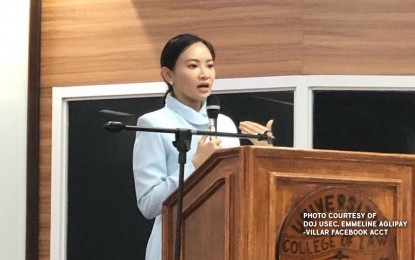
DOJ Undersecretary Emmeline Aglipay-Villar (File photo)
MANILA – The Department of Justice (DOJ) on Wednesday welcomed the Senate's approval of a measure to strengthen the country's anti-human trafficking laws.
"Some of the amendments to the existing Anti-Trafficking in Persons Act which are contained in SBN (Senate Bill Number) 2449 were recommendations from the IACAT (Inter-Agency Council against Trafficking) which we submitted to some senators last 2018," Justice Undersecretary Emmeline Aglipay-Villar said in a statement.
Villar said these recommendations were a product of their consultations with stakeholders and were reported through the Manila International Dialogue in December 2018.
Voting 22 in favor with no negative votes and abstentions, the upper chamber passed on third and final reading Senate Bill 2449 or the Expanded Anti-Trafficking Act of 2021, which seeks to amend Republic Act 10364 or the Expanded Anti-Trafficking in Persons Act of 2012.
The measure now covers online sexual abuse and exploitation of children which includes cases in which contact child abuse and/or exploitation offline is combined with an online component.
It also includes the facilitation of illegal adoptions and/or child laundering as an act of trafficking in persons and makes internet intermediaries accountable for “knowingly or by gross negligence allowing their infrastructure to be used for the purpose of promoting trafficking in persons.”
The measure also introduces “aggravating circumstances” such as when the crime is committed during a crisis, a public health concern, a disaster, a humanitarian conflict, or emergency situation, or when the trafficked person is a survivor of the same to punish perpetrators taking advantage of an adverse situation and vulnerability of the victims.
It also allows intercepting communications upon written order from the court in investigating violations involving the use of the internet and other digital platforms and that these will not be considered as illegal wiretapping or illegal interception.
Victims, regardless of age, will not be liable under the provisions if they record the act of exploitation, abuse, or violence against them.
The law also provides for the rescue and rehabilitation of trafficking victims. (PNA)
